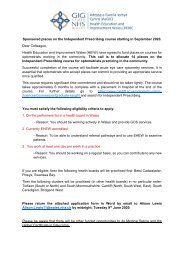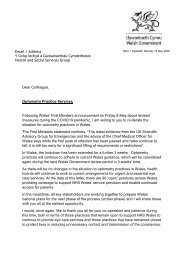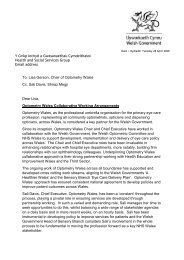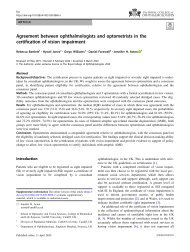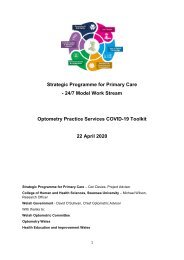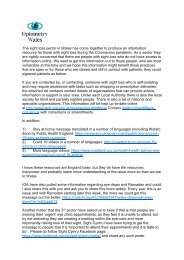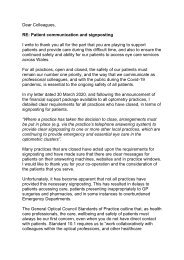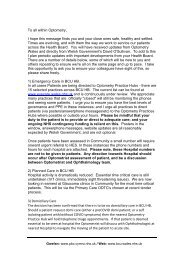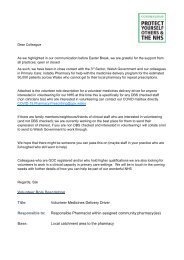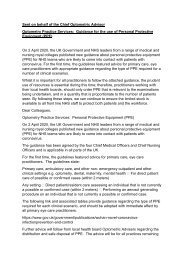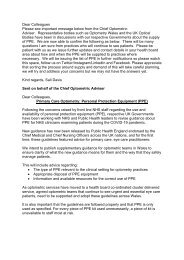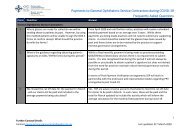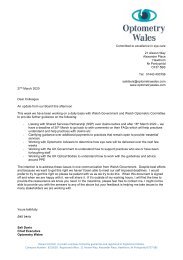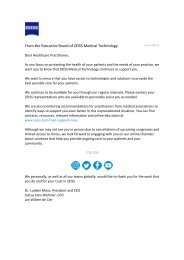Optometry Advice 26.03.2020 - Final
You also want an ePaper? Increase the reach of your titles
YUMPU automatically turns print PDFs into web optimized ePapers that Google loves.
Email / Address Date / Dydiadd: Friday, 27 March 2020<br />
Y Grŵp Iechyd a Gwasanaethau Cymdeithasol<br />
Health and Social Services Group<br />
Dear Colleague,<br />
<strong>Optometry</strong> Practice Services<br />
Further to my letters of 17 March and 19 March 2020, I write to you to provide<br />
additional information regarding,<br />
1. the provision of the Eye Health Examination Wales emergency, and General<br />
Ophthalmic Services essential community eye, care during the additional<br />
COVID-19 social distancing measures announced on 23 March 2020; and<br />
2. financial support for optometry practices providing Eye Health Examination<br />
Wales emergency, and General Ophthalmic Services essential community<br />
eye care.<br />
Provision of emergency or essential eye care during ‘lockdown’<br />
Community optometry practices in Wales providing emergency or essential eye care<br />
to remain open during ‘lockdown’<br />
On 23 March 2020 the UK Government and Welsh Government announced further<br />
social distancing measures considered to be necessary to slow the spread of<br />
COVID-19. As part of these additional social distancing measures, the UK<br />
Government published an initial list of further non-essential businesses and premises<br />
which were required to close, and exceptions within specific categories.<br />
The position of community optometry practices in relation to the initial list was<br />
unclear; however, the UK Government published an updated list on 25 March 2020,<br />
supported by the Welsh Government, explicitly stating that optometry practices<br />
(opticians) are permitted to remain open:<br />
https://www.gov.uk/government/publications/further-businesses-and-premises-toclose/further-businesses-and-premises-to-close-guidance.<br />
Planning and Preparation<br />
In developing and implementing local arrangements for the provision of emergency<br />
and essential eye care services, NHS Wales are asked to take cognisance of the<br />
speed with which change is occurring in relation to this pandemic. Health boards,<br />
optometric advisers, <strong>Optometry</strong> Wales and the Regional Optometric Committees, are<br />
therefore asked to consider the option of community optometry practice ‘clusters’, to<br />
reduce the number of practices required to remain open, whilst still providing
sufficient geographical cover of services within health board areas. At least one<br />
practice and up to three practices per ‘cluster’ would provide good coverage.<br />
Practices working in new and collaborative ways, coming together as clusters, will<br />
enable both the professional and non-professional workforce to be utilised fully and<br />
re-deployed as necessary. I would ask that all practices communicate succinctly, to<br />
effectively co-ordinate with their local health board Optometric Advisers, who act as<br />
the conduit for ophthalmic services, working across professional boundaries.<br />
Optometric clusters will align to the current health board primary care clusters and<br />
will link closely with the named cluster lead in each area.<br />
Where a practice has taken the decision to close, arrangements must be put in place<br />
(e.g. via the practice’s telephone answering system) to provide clear signposting to<br />
one or more other local practices, which are continuing to provide emergency and<br />
essential eye care in the optometric clusters.<br />
Additionally, all practices must inform NWSSP of closure (nwsspprimarycareservices@wales.nhs.uk),<br />
and those claiming the NHS fee during this<br />
period must provide a full list of both professional staff and non-professional staff<br />
who may be re-deployed to support the optometric clusters and/or wider NHS<br />
activity. The wider NHS activity could be supporting specialist health board managed<br />
eye care centres, or part of wider primary care teams such as GP or pharmacy<br />
teams.<br />
<strong>Optometry</strong> Wales circulated documentation on behalf of NWSSP in respect of<br />
practice available workforce. All practices are required to engage and provide<br />
response by 30 March 2020.<br />
Financial support<br />
In my letter of 17 March 2020, I described the financial support the Welsh<br />
Government will provide for practices. Further clarity and additional support<br />
measures are outlined below:<br />
a) All practices, if they remain open or if they are forced to close, will receive a<br />
monthly payment based upon their NHS service payments (GOS/WECS)<br />
averaged over the previous 3 year period. The current contractor<br />
reimbursement model will be suspended from the March scheduled payment.<br />
The new payment will take effect from the scheduled April 2020 payment for<br />
an initial 3 month period.<br />
b) Do not submit NHS claim forms during the new arrangement period. However,<br />
practices must maintain accurate records for all patients seen or advised, and<br />
an administrative record of all activity undertaken during the new arrangement<br />
period. Patient signatures are not required. Please note this is to ease the<br />
Rydym yn croesawu derbyn gohebiaeth yn Gymraeg. Byddwn yn ateb gohebiaeth a dderbynnir yn Gymraeg yn Gymraeg ac ni<br />
fydd gohebu yn Gymraeg yn arwain at oedi.<br />
We welcome receiving correspondence in Welsh. Any correspondence received in Welsh will be answered in Welsh and<br />
corresponding in Welsh will not lead to a delay in responding.<br />
Parc Cathays ● Cathays Park<br />
Caerdydd ● Cardiff<br />
CF10 3NQ<br />
Gwefan ● website:<br />
www.llyw.cymru<br />
www.gov.wales
administrative burden upon practices and prevent possible spread of the virus<br />
through the multiple use of pens. All examinations must be conducted in line<br />
with current regulations and guidelines through GOS and WECS. If urgent eye<br />
care is required this must be conducted by an EHEW accredited practitioner.<br />
c) All practices that remain open, to provide emergency and urgent eye care, will<br />
receive an additional payment of 25% of the calculated NHS service payment<br />
monthly average (as outlined at (a) above).<br />
d) For a practice to be open, an accredited optometrist must be present and<br />
provide NHS services. In line with the “Examining Patients” section below,<br />
practices are encouraged to adopt a closed-door policy.<br />
e) Opening hours must be in line with or within 75% of the normal opening hours<br />
submitted to NWSSP prior to Covid-19 working arrangements.<br />
f) If a practice, that has initially remained open, is forced to close, payment will<br />
revert to the average NHS payment as outlined in (a) above. Practices must<br />
inform NWSSP immediately of any closures.<br />
g) All practices that remain open and provide additional services to support<br />
health board ophthalmology departments (urgent cases), will be locally<br />
commissioned separately. This will be mainly related to review through an<br />
Ophthalmic Diagnostic and Treatment Centre (ODTC) for asymptomatic<br />
patients at high risk of sight loss. This may also include eye casualty<br />
arrangements in local health boards.<br />
Examining Patients.<br />
The latest guidance from the College of Optometrists can be accessed here<br />
https://www.college-optometrists.org/the-college/media-hub/news-listing/coronaviruscovid-19-guidance-for-optometrists.html<br />
https://www.college-optometrists.org/the-college/media-hub/news-listing/ppepersonal-protective-equipment-covid-19.html<br />
And includes:<br />
<br />
<br />
If you need to see patients for essential or urgent eye care, as well as using<br />
normal infection control procedures, and regular and scrupulous hand<br />
hygiene, there are things you can do to minimise the risk to you and your<br />
patients:<br />
Use a telephone or video triage system to determine whether patients need to<br />
be seen. The GOC has provided advice about undertaking remote<br />
consultations and prescribing.<br />
Rydym yn croesawu derbyn gohebiaeth yn Gymraeg. Byddwn yn ateb gohebiaeth a dderbynnir yn Gymraeg yn Gymraeg ac ni<br />
fydd gohebu yn Gymraeg yn arwain at oedi.<br />
We welcome receiving correspondence in Welsh. Any correspondence received in Welsh will be answered in Welsh and<br />
corresponding in Welsh will not lead to a delay in responding.<br />
Parc Cathays ● Cathays Park<br />
Caerdydd ● Cardiff<br />
CF10 3NQ<br />
Gwefan ● website:<br />
www.llyw.cymru<br />
www.gov.wales
(https://www.optical.org/filemanager/root/site_assets/publications/covid_19/Highlevel-principles-for-remote-prescribing_.pdf).<br />
<br />
<br />
<br />
<br />
<br />
<br />
<br />
<br />
<br />
<br />
<br />
<br />
<br />
<br />
Adapting your practice<br />
Lock the door so that patients are seen by appointment only.<br />
Maintain social distancing.<br />
Space out the chairs in the waiting and dispensing areas by at least 2 metres<br />
Limit the number of people in the practice and consulting room at any one<br />
time by spacing out appointments.<br />
Use a cough guard on your slit lamp. The Royal College of Ophthalmologists<br />
has advice on how you can make a temporary cough guard.<br />
Wipe clinical equipment and door handles after every patient, as well as other<br />
surfaces that may have been contaminated with body fluids using a suitable<br />
disinfectant such as an alcohol wipe. All surfaces must be clean before they<br />
are disinfected.<br />
Sanitise frames before patients try them on. If you need to focimeter patients’<br />
spectacles, ask the patient to take them off and provide the patient with a<br />
wipe to sanitise their frames before you touch them.<br />
Support good tissue practice (catch it, kill it, bin it) for patients and staff by<br />
having tissues and covered bins readily available.<br />
See patients by appointment only, and only those who have urgent eye or<br />
sight-related symptoms which cannot wait. These may be patients who would<br />
be seen using a MECS-type service, or sight tests for symptomatic patients<br />
where these are clinically necessary and cannot safely be postponed. Do not<br />
see patients without eye or sight related symptoms for routine sight tests.<br />
Use a telephone or video triage system to determine whether a patient needs<br />
to be seen. The GOC has issued advice on issuing spectacles and contact<br />
lenses to patients who are overdue for their appointments.<br />
As part of the triage, ask patients to confirm that they are well and that<br />
everyone in their household is not exhibiting relevant symptoms (new,<br />
continuous cough and/or a high temperature). Patients with these symptoms<br />
should not attend the practice, and should self-isolate.<br />
Ask patients to decontaminate their hands on entering the practice by<br />
providing them with a hand sanitiser or hand washing facilities.<br />
Reduce physical contact<br />
Rydym yn croesawu derbyn gohebiaeth yn Gymraeg. Byddwn yn ateb gohebiaeth a dderbynnir yn Gymraeg yn Gymraeg ac ni<br />
fydd gohebu yn Gymraeg yn arwain at oedi.<br />
We welcome receiving correspondence in Welsh. Any correspondence received in Welsh will be answered in Welsh and<br />
corresponding in Welsh will not lead to a delay in responding.<br />
Parc Cathays ● Cathays Park<br />
Caerdydd ● Cardiff<br />
CF10 3NQ<br />
Gwefan ● website:<br />
www.llyw.cymru<br />
www.gov.wales
Adapt your routine to reduce close contact with patients. For example using<br />
SL-BIO instead of direct ophthalmoscopy, or fundal imaging if that is an<br />
acceptable alternative.<br />
Have any discussions with the patient (e.g. symptoms and history, advice<br />
given) at a safe distance.<br />
You should use good hand hygiene before and after any patient contact, but<br />
try and avoid touching the patient where possible. For example you could ask<br />
the patient to open their eyes wide when looking down doing SL-BIO, or use a<br />
cotton bud to lift their lids if you need to do so.<br />
Other things you can do to minimise physical contact with patients include:<br />
<br />
<br />
<br />
<br />
<br />
<br />
<br />
<br />
Ask the patient to remove their spectacles themselves rather than you doing it<br />
Ask contact lens patients to insert and remove their lenses themselves (if<br />
possible), rather than you doing it,<br />
Ask patients to pull their lower lids down themselves if you are instilling eye<br />
drops, or using a tissue between your finger and their lids if you need to pull<br />
their lid down.<br />
We anticipate that you will only need to refract patients rarely, but if you do<br />
need to do so, use your professional judgement to decide in how much detail<br />
you need to refine your refraction, in order to minimise the time spent close to<br />
the patient. For example, do you really need to worry about the 0.25 cylinder?<br />
If you do need to touch the patient be particularly scrupulous about your<br />
hygiene before and after touching the patient, and ensure you decontaminate<br />
any equipment used appropriately.<br />
Because of the risk of aerosols or splashing of tears, if you use air-puff<br />
tonometry, particularly if this is hand held, consider whether this is really<br />
needed. For example if the patient has normal discs and visual fields then do<br />
you need to measure their IOP? Although they will not produce aerosols,<br />
similar considerations would apply if your only method of tonometry is using a<br />
Perkins or iCare tonometer, because of the close contact with the patient that<br />
is required.<br />
Because of the risk of aerosols, do not use Alger brushes. If you need to<br />
remove a rust ring, use a needle instead.<br />
Consider your referrals carefully. Non-urgent patients are unlikely to be seen<br />
in the hospital for many months, so would it be better for you to monitor them<br />
Rydym yn croesawu derbyn gohebiaeth yn Gymraeg. Byddwn yn ateb gohebiaeth a dderbynnir yn Gymraeg yn Gymraeg ac ni<br />
fydd gohebu yn Gymraeg yn arwain at oedi.<br />
We welcome receiving correspondence in Welsh. Any correspondence received in Welsh will be answered in Welsh and<br />
corresponding in Welsh will not lead to a delay in responding.<br />
Parc Cathays ● Cathays Park<br />
Caerdydd ● Cardiff<br />
CF10 3NQ<br />
Gwefan ● website:<br />
www.llyw.cymru<br />
www.gov.wales
in practice instead? For example, if you would normally refer a patient for<br />
cataract and postpone dispensing their spectacles until after surgery, it may<br />
be better to discuss with them whether it would be worth them having their<br />
spectacles updated as they will have to wait longer than usual for surgery.<br />
<br />
<br />
<br />
For essential eye care, consider whether you need a patient to come in for<br />
dispensing. If they simply need a reglaze or have broken their specs – can<br />
you repair or reglaze them by post, or make a duplicate pair from the<br />
information you already have on file?<br />
If the patient needs new spectacles, post these to the patient rather than<br />
asking them to come in for collection.<br />
Remember to make it clear from your clinical record that the patient was seen<br />
during the COVID-19 pandemic, to help explain your decision making where<br />
necessary<br />
Emergency Centres and Ophthalmology <strong>Advice</strong><br />
Optometrists providing care in primary care optometric practices are advised not to<br />
examine patients who are symptomatic of, or who are a known case of Covid-19.<br />
Health boards are establishing emergency centres where these patients can be<br />
directed for assessment of urgent eye care needs. Please contact your local health<br />
board Optometric Adviser who will advise you of the relevant contact details and<br />
pathways to refer symptomatic patients.<br />
During this period of ‘lockdown’, access to urgent ophthalmological opinion will be<br />
required at times. Health board Optometric Advisers will co-ordinate services being<br />
provided in the hospital setting and contact details for urgent advice.<br />
Enquiries<br />
As previously described, I will continue to work with key stakeholders to support the<br />
whole profession through this extremely difficult and challenging period. Weekly<br />
telephone calls will continue between Welsh Government, <strong>Optometry</strong> Wales, Welsh<br />
Optometric Committee, Health Education and Improvement Wales and health board<br />
Clinical Leads and all Optometric Advisers. As detailed in this letter, planning for eye<br />
care services will take place at local health board level, between health boards, their<br />
Optometric Adviser, Regional Optometric Committees and <strong>Optometry</strong> Wales. The<br />
first point of contact for further enquiries should be:<br />
<strong>Optometry</strong> Wales<br />
Sali Davis - Sali.davis@optometrywales.com<br />
Rydym yn croesawu derbyn gohebiaeth yn Gymraeg. Byddwn yn ateb gohebiaeth a dderbynnir yn Gymraeg yn Gymraeg ac ni<br />
fydd gohebu yn Gymraeg yn arwain at oedi.<br />
We welcome receiving correspondence in Welsh. Any correspondence received in Welsh will be answered in Welsh and<br />
corresponding in Welsh will not lead to a delay in responding.<br />
Parc Cathays ● Cathays Park<br />
Caerdydd ● Cardiff<br />
CF10 3NQ<br />
Gwefan ● website:<br />
www.llyw.cymru<br />
www.gov.wales
Optometric Advisers<br />
Aneurin Bevan University Health Board – Mike George Mike.George@wales.nhs.uk,<br />
Stephanie Campbell Stephanie.campbell@wales.nhs.uk<br />
Betsi Cadwaladr University Health Board – position vacant<br />
Cardiff & Vale University Health Board – Sharon Beatty-<br />
Sharon.Beatty2@Wales.nhs.uk<br />
Cwm Taf Morgannwg University Health Board – Tim Palmer –<br />
timothy.palmer@wales.nhs.uk<br />
Hywel Dda University Health Board – Rebecca Bartlett –<br />
rebecca.john2@wales.nhs.uk<br />
Powys Teaching Health Board – Paul Cottrell – paul.cottrell2@wales.nhs.uk<br />
Swansea Bay University Health Board – Lyndsay Hewitt –<br />
Lyndsay.hewitt@wales.nhs.uk<br />
Thank you for your continued patience and hard work during these difficult and<br />
unprecedented times.<br />
Yours sincerely,<br />
David O’Sullivan<br />
Chief Optometric Adviser / Prif Optometrig Ymgynghorol<br />
Swyddfa'r Prif Swyddog Meddygol / Office of the Chief Medical Officer<br />
Directorate of Health Policy / Cyfarwyddiaeth Polisi Iechyd<br />
Department for Health and Social Services / Yr Adran Iechydm a Gwasanaethau<br />
Cymdeithasol<br />
Welsh Government / Llywodraeth Cymru<br />
Cathays Park, Cardiff CF10 3NQ / Parc Cathays, Caerdydd CF10 3NQ<br />
Rydym yn croesawu derbyn gohebiaeth yn Gymraeg. Byddwn yn ateb gohebiaeth a dderbynnir yn Gymraeg yn Gymraeg ac ni<br />
fydd gohebu yn Gymraeg yn arwain at oedi.<br />
We welcome receiving correspondence in Welsh. Any correspondence received in Welsh will be answered in Welsh and<br />
corresponding in Welsh will not lead to a delay in responding.<br />
Parc Cathays ● Cathays Park<br />
Caerdydd ● Cardiff<br />
CF10 3NQ<br />
Gwefan ● website:<br />
www.llyw.cymru<br />
www.gov.wales




